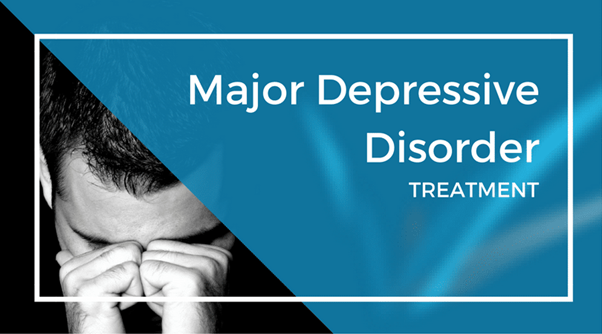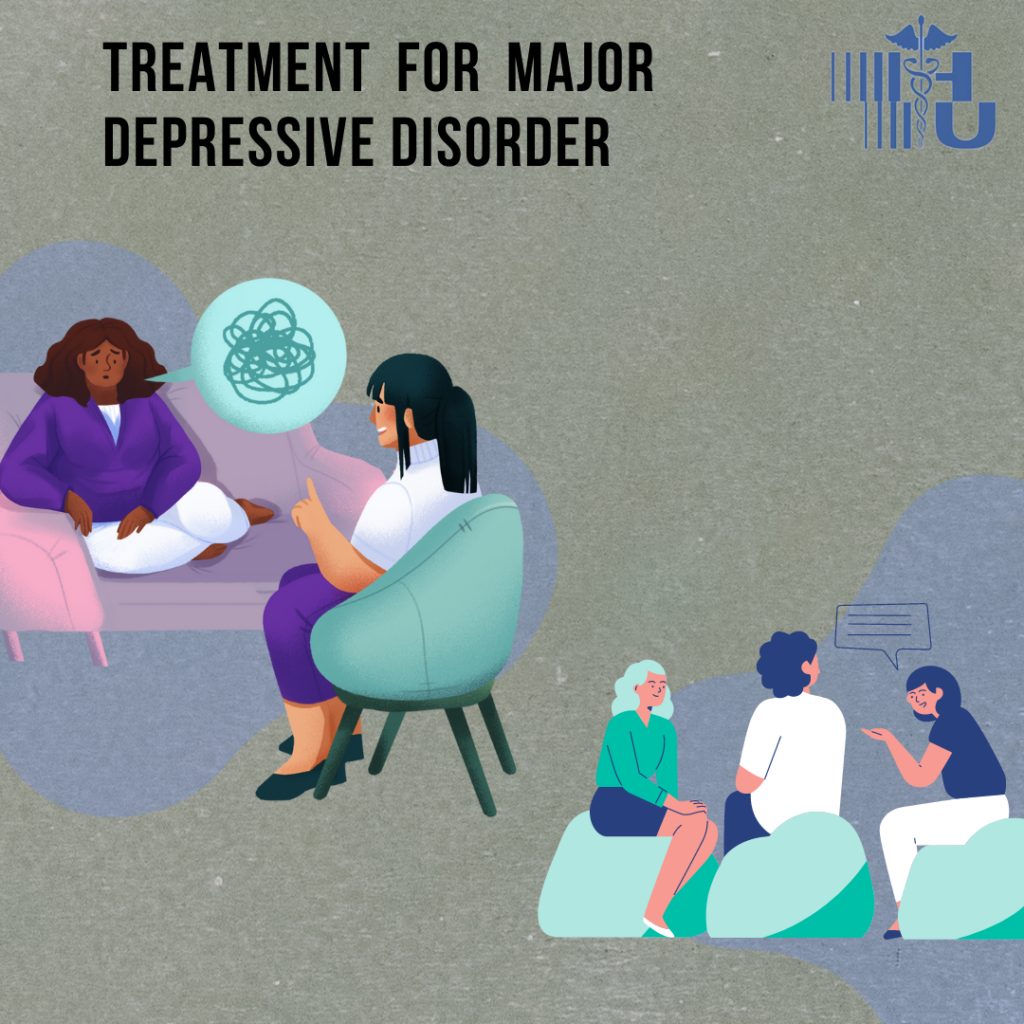Published on: April 17, 2023

Millions of individuals around the world suffer from Major Depressive Disorder (MDD), a significant mental health illness that leaves sufferers with persistent feelings of melancholy, hopelessness, and a lack of interest in once-enjoyable activities. If left untreated, MDD can significantly impact an individual’s quality of life, making it important to seek effective treatment. This article will discuss the most effective Major Depressive Disorder treatment options, the best treatment plan, and the treatment guidelines to help individuals manage their symptoms and lead fulfilling lives.

Major Depressive Disorder Treatments are Selective Serotonin Reuptake Inhibitors (SSRIs), Serotonin-Norepinephrine Reuptake Inhibitors (SNRIs), Atypical Antidepressants, Tricyclic Antidepressants.
Major Depressive Disorder Treatment is important to seek effective treatment for MDD to manage the symptoms and lead a fulfilling life. For the treatment of MDD, doctors can prescribe a variety of different drugs, each of which has advantages and potential drawbacks of its own. In this article, we will discuss the most effective treatments for MDD.
Since they are seen as being safer and generally having less adverse effects than other antidepressants, SSRIs are frequently used as the first-line treatment for MDD. They function by raising serotonin levels in the brain, which can elevate mood and lessen depressive symptoms. Citalopram (Celexa), escitalopram (Lexapro), fluoxetine (Prozac), paroxetine (Paxil, Pexeva), sertraline (Zoloft), and vilazodone are some examples of common SSRIs (Viibryd).
Another class of antidepressant known as SNRIs works by raising the brain’s levels of both serotonin and norepinephrine.
Atypical antidepressants are a class of drugs that don’t cleanly fit into any of the other antidepressant subcategories. Bupropion (Wellbutrin XL, Wellbutrin SR, Aplenzin, Forfivo XL), mirtazapine (Remeron), nefazodone, trazodone, and vortioxetine are a few examples of atypical antidepressants (Trintellix).
Compared to more recent antidepressants, tricyclic antidepressants are an older class of medication that can be quite effective but also has more serious adverse effects. Most of the time, these medications—such as imipramine (Tofranil), nortriptyline (Pamelor), amitriptyline, doxepin, trimipramine (Surmontil), desipramine (Norpramin), and protriptyline (Vivactil)—are not administered unless an SSRI has been tried first and failed to help.
Because they can have substantial negative effects, MAOIs, an older class of antidepressants, may be used when other medications haven’t helped. Due to potentially harmful (or even fatal) interactions with specific foods, drugs, and herbal supplements, using MAOIs necessitates following a careful diet.
Two antidepressants may be combined by your doctor, or additional drugs such mood stabilisers or antipsychotics may be added. Medication for stimulants and anti-anxiety symptoms may also be added for short-term use.

Medications such as selective serotonin reuptake inhibitors (SSRIs), serotonin-norepinephrine reuptake inhibitors (SNRIs), atypical antidepressants, tricyclic antidepressants, and monoamine oxidase inhibitors (MAOIs) can be prescribed by a primary care physician or psychiatrist to relieve symptoms of MDD. It is important to work closely with a healthcare provider to determine the most effective medication and dosage for your needs. It is also important to understand that medications can take several weeks to start working and may cause side effects.
Psychotherapy, or talk therapy, can help individuals with MDD learn coping skills, improve their mood and manage their symptoms. There are several different types of psychotherapy that can be effective for MDD, including cognitive-behavioral therapy (CBT), interpersonal therapy (IPT), and psychoanalytic therapy. It is important to work with a mental health professional to determine the most effective type of psychotherapy for your individual needs.
Many people with MDD also benefit from seeing a psychiatrist, psychologist, or other mental health professional. These professionals can provide a comprehensive approach to treatment, including medication management and psychotherapy. They can also help individuals address underlying mental health conditions, such as anxiety or substance abuse, contributing to their MDD.
The American Psychiatric Association (APA) publishes guidelines for treating MDD. According to the APA, the first-line treatment for MDD is either medication or psychotherapy. These two treatment options can be used alone or in combination, depending on each patient’s individual needs.
The APA recommends the use of antidepressant medication in the treatment of MDD. Antidepressants can effectively reduce symptoms of MDD, including sadness, lack of energy, and feelings of hopelessness.
When prescribing medication, healthcare professionals should consider several factors, including the patient’s age, overall health, and the severity of the symptoms. The APA recommends monitoring patients closely for side effects, especially during the first few weeks of treatment.
Psychotherapy, or talk therapy, is an effective treatment for MDD. There are several types of psychotherapy that can be used to treat MDD, including cognitive-behavioral therapy (CBT), interpersonal therapy (IPT), and psychodynamic therapy. The APA recommends that patients receive psychotherapy from a licensed mental health professional.
When selecting a type of psychotherapy, healthcare professionals should consider the patient’s needs and preferences. The APA recommends that patients receive between 12 and 16 sessions of psychotherapy, although the actual number of sessions needed may vary depending on the individual patient.
The APA recommends that combination treatment with medication and psychotherapy be considered for patients with moderate to severe MDD. Combination treatment may be more effective than either medication or psychotherapy alone. When using combination treatment, healthcare professionals should consider the patient’s needs and preferences and any potential side effects.
The latest updates on the treatment of major depressive disorder (MDD). However, I can provide some general information on recent advancements in the field. It’s essential to consult with a healthcare professional or stay updated with current research for the most accurate and up-to-date information. Here are a few notable developments:
Ketamine and Esketamine: Ketamine, an anesthetic medication, and its derivative esketamine have shown promise in rapidly reducing depressive symptoms, even in treatment-resistant depression. Both intravenous ketamine and nasal spray esketamine have received FDA approval for the treatment of MDD.
Psilocybin and MDMA-Assisted Psychotherapy: Research is exploring the therapeutic potential of psychedelic substances like psilocybin (found in magic mushrooms) and MDMA (commonly known as ecstasy) in combination with psychotherapy for the treatment of MDD and other mental health conditions.
Digital Therapeutics and Mobile Apps: With advancements in technology, digital therapeutics and mobile applications have emerged as additional tools for managing MDD. These platforms offer various self-help resources, mood tracking, cognitive behavioral therapy (CBT) exercises, and mindfulness practices to support individuals with depression.
Personalized Medicine and Genetic Testing: The field of pharmacogenomics aims to identify genetic markers that can predict an individual’s response to specific antidepressant medications. Genetic testing may help guide treatment decisions by identifying medications that are more likely to be effective and have fewer side effects for a particular patient.
It’s important to note that the treatment of MDD is highly individualized, and not all treatment options are suitable for everyone. The best approach to managing depression involves a comprehensive assessment by a qualified healthcare professional who can recommend appropriate treatments based on the individual’s specific needs and circumstances.
For more information about Mental Health Conditions. Visit our Mental Health Library page. To understand and cope with your Major Depressive Disorder Treatments, get help from our Top 10 Psychiatrists, Psychologists, and Therapists who are known for providing the best mental health treatment and psychiatry services. To book an appointment please call us at (800) 457-4573 or submit an appointment request.
Discover the essence of Harmony United Psychiatric Care through our impactful numbers. Our experienced team is dedicated to fostering mental well-being.
10
+
Years of Experience
With 10 years of unwavering commitment to mental health, we bring a wealth of experience to support our patients on their journey.
About Us58
+
Providers
Our dedicated team comprises 58 skilled therapists', psychiatrists', psychologists', ensuring personalized and expert care for each individual.
Providers13
+
Locations
Across multiple locations, we extend our reach to provide accessible mental health care tailored to diverse communities.
Locations70000
+
Patients Served
Over 70000 patients have entrusted us with their mental well-being, experiencing compassionate care and positive outcomes.
Book AppointmentWelcome to the latest edition of “Discover Harmony,” the newsletter from Harmony United Psychiatric Care! In this edition, we bring you insights, updates, and valuable information to support your mental well-being journey.
Subscribe to newsletter